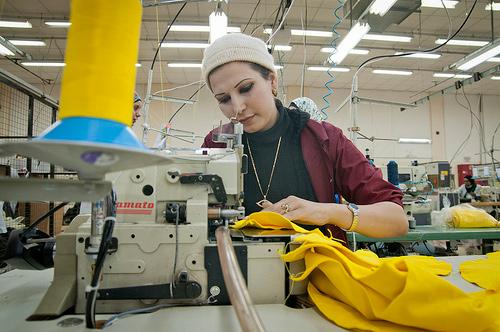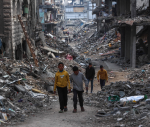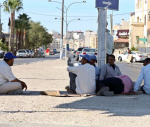You are here
Migrant workers at factories file complaint, cite safety, rights violations
By Ana V. Ibáñez Prieto - Sep 13,2018 - Last updated at Sep 13,2018

An unidentified worker is seen at a QIZ factory in this undated photo (Photo courtesy of Better Work, ILO/IFC)
AMMAN — Poor ventilation, plumbing, sanitary services, failure to renew work permits and delayed payments are some of the violations that Bangladeshi and Indian workers at factories in the Al Hassan Industrial Estate in Irbid have recently reported to a legal aid organisation in Amman.
"The factory owners undermine our rights by exploiting our legal status and delaying the renewal of our work permits and residence, obliging us to accept the factories' working conditions and refrain from demanding our rights under the law," the workers said in the complaint submitted to Tamkeen Fields for Aid late August, stressing that "several months have passed since the work permits of some workers expired, and even years in other extreme cases”.
Al Hassan Industrial Estate is one of the 18 Qualified Industrial Zones (QIZ) across Jordan, which started in 1996 as the result of a US Congress decision aimed at fostering economic relations between Jordan, Israel and Egypt.
According to figures from the International Labour Organisation (ILO), the factories in the QIZ employ over 50,000 migrant labourers from Bangladesh, Sri Lanka and Nepal, who produce textiles for export to US brands and reside in the factories’ housing units.
Although a free trade agreement signed between the governments of Jordan and the US in 2000 listed the obligations of both parties, as members of the ILO, to respect and protect the rights of workers, violations recorded within the QIZ placed it on the US State Department’s List of Goods Produced by Child Labour or Forced Labour from 2009 to 2016.
In 2016, as the Jordanian government took further steps to improve the living conditions of workers, Tamkeen condemned the “undignified” working conditions of some labourers based in the QIZ, citing violations discovered at two garment factories after receiving “hundreds of complaints”.
“They live in crowded housing units, cook their food in the hallways and work for long hours while being deprived of their pay and having their passports seized by their employers,” Tamkeen director, Linda Kalash, told The Jordan Times, noting that violations also included verbal or physical abuse.
Later that year, the ministries of health and labour signed a breakthrough agreement that entrusted government officials to inspect the housing units where garment migrant workers reside, aiming to improve the working and living conditions of the tens of thousands of workers.
Abdallah Al Jbour, director of labour inspection at Jordan’s Ministry of Labour said this was “an essential step for the sector — one which stakeholders have been awaiting for the past five years”.
But, two years into the agreement, stakeholders still question the effectiveness of the deal.
“Despite the steps undertaken to combat the violations, Tamkeen keeps on dealing with similar cases,” Kalash said, noting that the organisation received a total of 11 collective complaints involving hundreds of workers in 2017, and an additional four so far this year.
“Overall, the situation in the QIZ is better than in the previous years, but several factories continue to incur worrisome violations concerning accommodation, unpaid salaries, long working hours and confiscation of passports,” Kalash continued, stressing that “since employers do not issue labour or residency permits for the workers, they cannot return to their home countries without paying overstay fines.”
Jordan Labour Watch Director Ahmad Awad said that while the working and housing conditions improved in the large factories, many violations continue in small facilities. “Working conditions are still poor in terms of non-receipt of salaries, failure to renew work permits, poor housing conditions and other forms of mistreatment,” he told The Jordan Times.
Awad attributed this to the “weakness and ineffectiveness” of labour inspections on the ground, noting that “the number of inspectors is relatively small when compared to the required tasks, in addition to the inadequate training of inspectors”.
Spokesperson of the Ministry of Labour, Mohammad Al Khatib, told The Jordan Times that since the implementation of the agreement to inspect the housing units, “the ministry has continued to carry out its duty through several teams and committees, inspecting any violations concerning the provisions of the Labour Law, the working conditions the occupational health and safety standards”.
“Some violations related to irregularities in the housing conditions have been registered before and processed immediately,” the official continued, saying that “follow-up inspections are conducted in the factories and housing until all violations have been eliminated.”
Fathallah Emrani, president of the General Trade Union of Workers in Textile, Garment and Clothing Industries, pointed out that “since its inception, the union has continued to cooperate with the Ministry of Labour to protect the rights of all workers”, noting that “83 labour inspectors have been trained to do this work, and we are dealing with current issues through dialogue”.
“We have not received any complaints about housing recently and I am confident that this sector is stable and sustainable,” Emrani continued, saying the union is “constantly working around the clock to follow up on the affairs of workers”.
“We have four field offices to receive inquiries and complaints from workers and the union organises periodical workshops aimed at raising awareness among employees, in addition to the distribution of publications that ensure workers that they are not alone,” he added.
“Important progress” has been achieved in the sector according to the ninth annual update by Better Work Jordan (BWJ), an initiative implemented by the ILO and the International Finance Corporation with the aim of setting legal frameworks for migrant garment workers.
However, more needs are to be done for the industry to move beyond compliance according to the report, which provides a picture of the compliance situation among 74 factories assessed in 2017.
The programme’s assessment found that non-compliance trends have slightly changed from previous years and mostly concentrated in the areas of working conditions, contracts, human resources, occupational safety and health standards.
However, the report also found areas of “significant improvement”, with fewer cases of discrimination related to working hours, positive recruitment practices and decreased incidence of excessive recruitment fees.
Having entered its third phase in 2017, the BWJ programme will now continue to expand its services to both garment and non-garment sectors, strengthening its efforts to build the capacity of national partners beyond enforcing compliance.
“This year, we [BWJ] have focused on the workers’ well-being, including mental health issues and the activation of digital payments in order to provide them with better ways to control their income and ensure that they surpass the minimum wage,” said BWJ Programme Manager Tareq Abu Qaoud, adding that “the working conditions of migrant workers are also one of the key themes as expatriate workers from Southeast Asia account for almost 75 per cent of employees in the sector”.
“But the programme’s activities are not limited to the garment industry and they could soon be expanded into other factory sectors, agriculture and construction,” he told The Jordan Times, saying that BWJ is currently working with the EU to apply their model to all enterprises exporting through the 2016 EU relaxed rules of origin.
Related Articles
AMMAN — A legal aid organisation has condemned the “undignified” work conditions some labourers experience in the Qualified Industrial Zones
AMMAN — The Labour Ministry on Thursday said that violations reported at garment factories in Qualified Industrial Zones (QIZ) were “minor”
AMMAN — Authorities are investigating reported human trafficking offences committed against dozens of labourers in a garment factory in Irbi
















